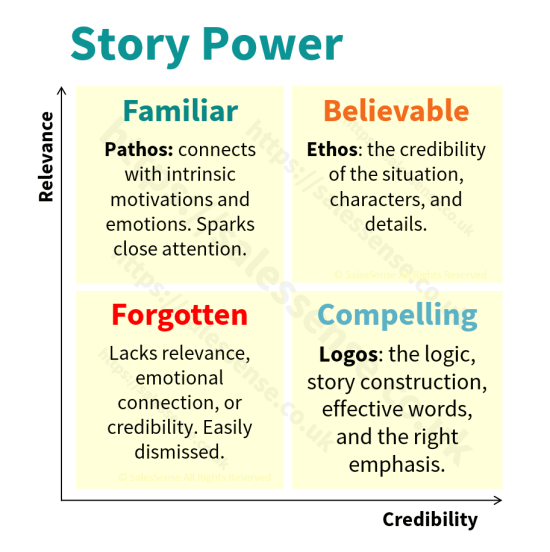Forthought, planning, and preparation allow anyone to deliver effective sales stories.

The power of sales stories is well known yet many salespeople make little use of the knowledge. This article is about becoming a storyteller to better communicate the benefits and advantages of any product, service, solution, vendor, or cause.
The main reason that people don't use more stories when setting out to persuade is lack of preparation. Given a framework and some guidelines, anyone should be able to construct and learn effective stories. Here is the framework.
1. A person or organisation is experiencing a difficulty or problem.
Be specific. Who is the subject of the story? What is the issue?
2. They try different ways to resolve the issue.
Depending on the type of story you are telling, part two can be short or long. Use facts to make the story convincing.
3. The people in the story find a solution.
Describe what they did.
4. Describe the results.
Be specific. Quantify the results in terms of percentages or the numerical change experienced. Include a timeframe. Say how long it took to get the results.
Twelve Types of Sales Stories
Use the framework to prepare sales stories for all of the situations you can think of. Here are twelve possibilities:
Case Studies: Stories that illustrate how a client used a product or service to solve a problem or achieve significant results.
Testimonials: Personal anecdotes from satisfied customers highlighting their positive experiences and outcomes.
Overcoming Objections: Stories that address common concerns or objections, indicating how these were successfully resolved by others.
Company Origin: Narratives that explain how and why the company was founded, highlighting the mission, vision, and values that drive the business.
Value Proposition: Stories that illustrate the unique benefits and value the product or service offers, emphasizing how it stands out from competitors.
Personal Experience: Your experiences of using the product or service, demonstrating personal belief and confidence in its value.
Prophecy: Future-focused stories that paint a picture of what the prospect's business could look like after implementing the product or service, often leveraging trends and future predictions.
Customer Journey: Narratives that map out a typical customer’s journey, from the initial problem to the ultimate solution provided by the product or service, detailing the transformation and benefits realised.
"Day in the Life": Descriptions of a day in the life of a customer before and after using the product or service, highlighting practical, everyday improvements.
Secondary Impact: Stories that showcase the broader impact of the product or service, such as community benefits, environmental impact, or industry changes.
Problem-Solution: Simple narratives that define a specific problem and then illustrate how the product or service provided the solution.
Failures and Disasters: Cautionary tales about businesses or individuals who failed to use the right solution and the negative consequences they faced, highlighting the importance of making the right choice.
Innovation: Stories explaining how the company or product has innovated or evolved over time to meet changing market demands or to stay ahead of the competition.
By preparing and learning a repertoire of appropriate stories, salespeople can better connect with prospects, address their concerns, and demonstrate the tangible benefits of their offerings. Succinct, well-told stories cause listeners to imagine and in imagining, put themselves in the story. What is more, stories that don't brag, influence and persuade without seeming like a salespitch.
Article by Clive Miller
If you need to develop sales stories, we can help. Telephone +44 (0)1392 851500. We will be pleased to discuss your needs or talk through the options. Alternatively email custserv@salessense.co.uk or use the contact form here.












